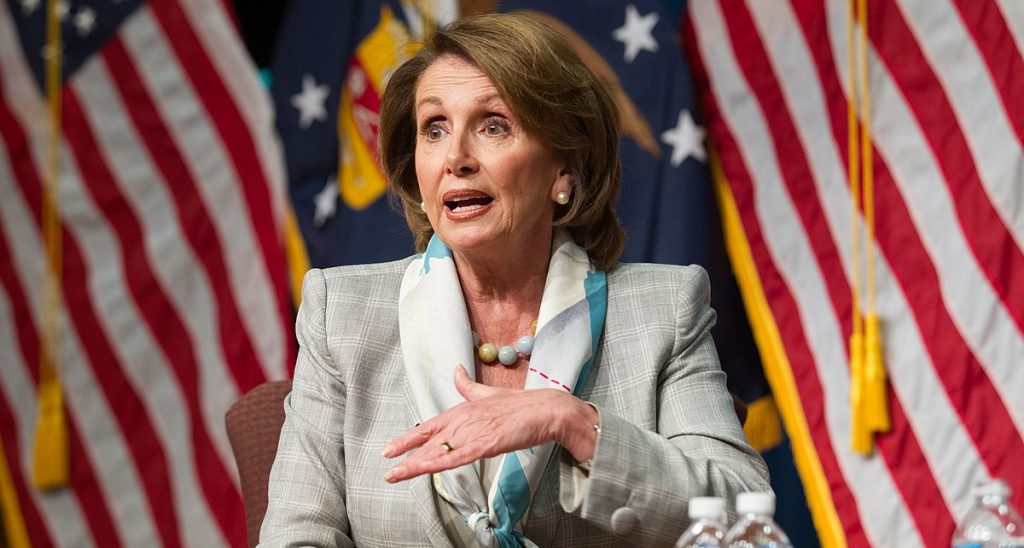Can Pelosi flip enough votes? Probably not without conceding her job.
The attempted Pelosi ouster is crumbling. House Minority Leader Nancy Pelosi (D-CA) heads into today’s Democratic Caucus leadership elections unopposed in the race for Speaker. However, her quest for the gavel isn’t over. Pelosi needs a majority of those “voting for speaker by name” to prevail when the full House votes in January. Winning the caucus vote helps, but she isn’t out of the woods. The question remains: does she have enough tools to win over hold-outs on the floor?
Two groups of Democrats are on record opposing her: those who signed Rep. Seth Moulton’s (D-MA) anti-Pelosi letter (minus at least two who have signaled a reversal) and those who pledged opposition during their campaigns. If the remainder of those two groups hold the line, Pelosi likely doesn’t have the floor votes. Additionally, a group of moderate Democrats in the Problem Solvers Caucus are withholding support until she backs their reform proposals, and there could be latent opposition among the 41 Democrats currently avoiding questions about their support for Pelosi. Meanwhile, this is far from Pelosi’s first challenge. Rep. Tim Ryan (D-OH), a largely unknown member prior to challenging Pelosi , won a third of the caucus vote, a surprising number, in 2016. Rep. Heath Shuler (D-NC) won a sizable vote from the caucus in 2010 after Democrats lost in the midterms. Her opposition is more formidable than the “anti-Pelosi forces stumble” headlines suggest. Even after winning the caucus vote, Pelosi has work to do to shore up her election.
The members who made campaign promises remain her biggest problem and are under-profiled players in this saga. Leaders hold a lot of institutional resources to stave off challenges, including promising DCCC support for members’ reelection campaigns, plum committee assignments, or legislative action. The question remains, are those tools enough to convince these members it is worth breaking a promise to voters? They could dodge the question by voting present or “tend to personal business” during the speakership vote and thereby not support her by not participating. But even then, it is easy to envision campaign ads in these districts calling out an obvious dodge.
Committee assignments are the best resource for Speakers to win support. Each House committee will have roughly four to six more Democrats in the 116th Congress. Multiply that by 21 standing committees and there would seem to be more than enough seats to assuage 20-30 remaining holdouts in her caucus. Some members have already been won over with committee assignments, after all.
But it’s not that simple. Committees vary in prestige and influence. There are five or six very popular committees (Appropriations, Ways and Means, Energy and Commerce, Financial Services, and a couple others like Armed Services depending on the member’s constituency). Therefore, only a handful of committees are considered plum assignments. It’s not uncommon for these committees to gather long waiting lists. Members who missed out on their top request will often serve on less desirable committees, waiting for that prized Ways and Means slot they’ve been eyeing for six years. Additionally, incoming members who previously lost seats following the 2010 elections may push to be reinstated to their previous posts. Put plainly, many seats on these committees are spoken for, reducing the number of plum slots for the Speaker to dole out.
This is potentially a problem for Pelosi. She’s running out of institutional resources. She promised the growing Progressive Caucus more influence on major committees in exchange for their support. Other members were won over with promises to bring legislation to the floor, additional leadership opportunities, and creating select committees. At some point, becoming the 12th assistant leader (for example) becomes a completely hollow concession. She may have reached a point where she’s run out of carrots, and sticks aren’t great motivators for holdouts. Eventually, it reaches a zero sum game where making a deal with one member means breaking it with another. While we don’t know how far away Pelosi is from that point, she gets closer every day.
Pelosi has made a lot of promises, leveraged a lot of her power, and still faces a contingent who could block her floor election. The institution and its resources can only take one so far. We may have already reached a point where Pelosi’s institutional authority has been maxed out. With so many members politically dedicated to not supporting her, and many holdouts still waiting for carrots, it appears likely she will have to take an extra step. It’s not wise to bet against this master tactician, but based on the institutional resources she has remaining, it doesn’t appear she has won over enough votes. It’s unlikely someone not named Pelosi is Speaker in the 116th. But she may be forced commit to a final term as House leader. That could change, but should she take that step in the coming days or weeks, the “crumbling efforts” of the insurgents may have been worthwhile after all.
| Topics: | Representation & Leadership |

